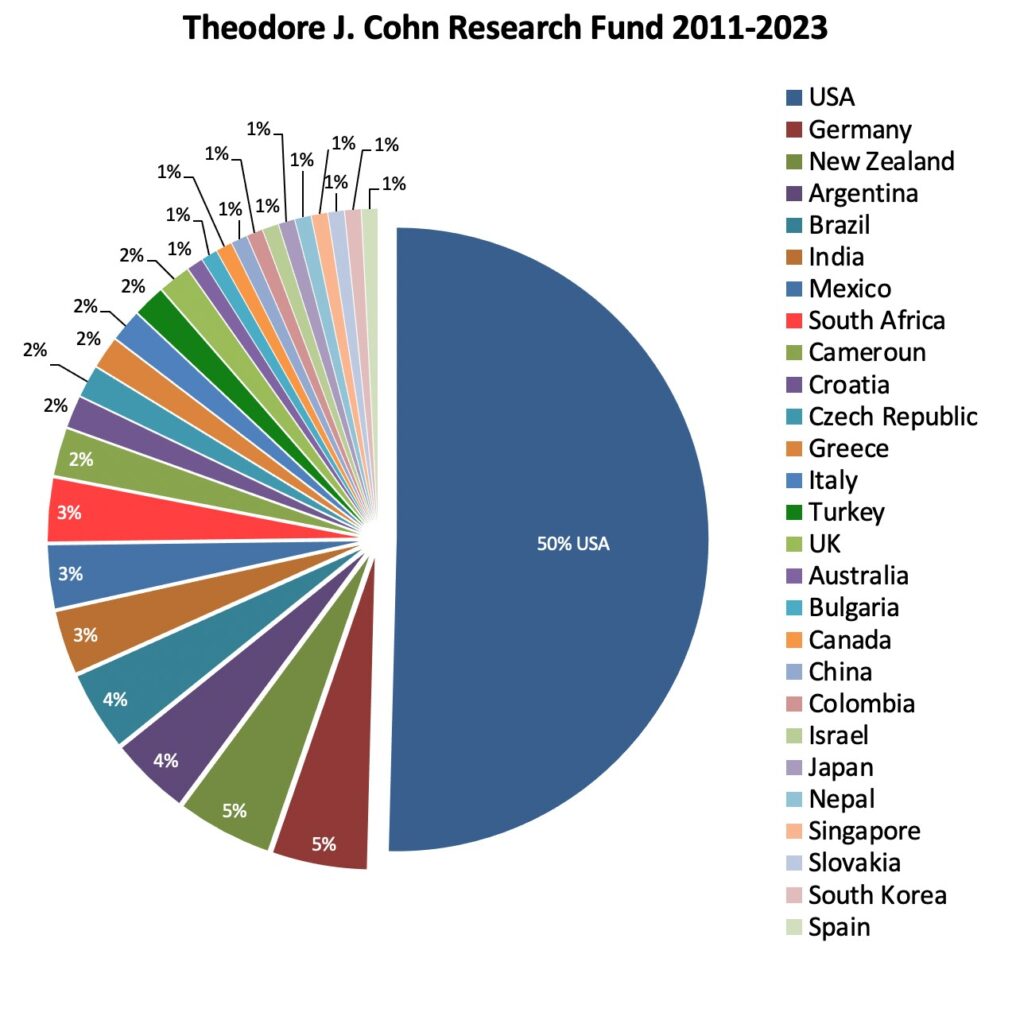Call for applications for 2025
Application Deadline: CLOSED UNTIL 2025
The Theodore J. Cohn Research Fund is primarily to fund research projects in Orthoptera and the other 9 orders of Polyneoptera (Blattodea, Dermaptera, Embioptera, Grylloblattodea, Mantodea, Mantophasmatodea, Phasmatodea, Plecoptera, and Zoraptera) by those new to research, often as part of a master’s or Ph.D., though Postdoctorates may also be funded. A total amount of $15,000 USD per year is available and it is possible to fund research grants for up to $1,500 per grantee. The fund is named in honor of the respected orthopterist, Theodore “Ted” J. Cohn (1930-2012), who was a generous benefactor of the Orthopterists’ Society and encouraged many young orthopterists during his lifetime.
The Committee will consider all requests with the same attention and benevolence. The quality of English will not be a criterion and we are ready, at the level of the Committee, to help the students to better formulate their projects in English if necessary. In the end, the intrinsic quality and originality of the research project will be the only criteria. We strongly encourage students and young researchers from Africa and Asia (under-represented in the grants) to submit a project. Other than being a student, the ONLY requirement is that the applicant be a member of the Orthopterists’ Society in good standing.
Proposals should include the following 3 sections and restricted to the indicated number of pages for each:
1) DESCRIPTION (one page)
i) TITLE
ii) SIGNIFICANCE – Emphasize the new ideas and aspects of the proposal, expected contribution to theory, relation to previous work, etc. Applicants should emphasize the nature and significance of their proposal to provide members of the award committee with the basis for weighing different projects, especially in fields outside their expertise.
iii) RESEARCH PLAN – Include the particular polyneopterans to be studied, methods, logistics, etc.
iv) TIMETABLE – Even if approximate, to give the judges some idea of feasibility.
2) CURRICULUM VITAE (half page) – Include name, full address, present position or years in graduate school, education, number of papers published or completed, citation of selected publications pertinent to the proposal to aid the judges.
3) BUDGET (half page) – Include justification of items where appropriate (e.g., why special equipment is necessary unless clearly obvious), other funding for the project, etc. Overheads cannot be provided for on Society grants.
The Committee prefers proposals applicable to broad biological problems, even though the actual research may be narrower in scope. Proposals also should include clearly stated hypotheses and aims, and the nature of the evidence to be gathered to test the hypothesi(e)s and possible outcomes. But taxonomic projects may also be funded, particularly coming from African countries.
Proposals from graduate students must include a simple recommendation from their major professor or advisor. Those not affiliated with an educational or research institution should indicate where the work is to be done.
After the research is completed, successful applicants are required to write a short report, which will be published in the next-available issue of our newsletter Metaleptea, and be suitable for both orthopterists and non-specialist readers.
Proposals should be submitted to Michel Lecoq, Manager of the Theodore J. Cohn Research Fund Committee.
Click here to see a list of past recipients and their interesting projects.
